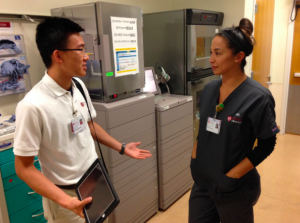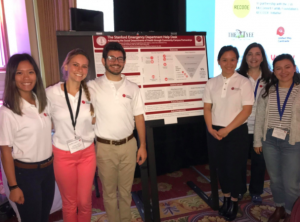SHAR(ED) – Connecting Emergency Department Patients with Support Resources
Perspective on the importance of addressing the social determinants of health for emergency department patients.
Guest Blog Author: Joshua Bloomstein, SHAR(ED) Volunteer Media and Technology Chair
SHAR(ED), Stanford Health Advocacy and Research in the Emergency Department, aims to improve the lives of emergency department patients using a public health approach.
At the SHAR(ED) Help Desk, volunteer research assistants identify emergency department patients with unmet social needs and connect these patients to local resources. We follow-up with patients by calling them at two week intervals to make sure they get the help they need.
On one shift, I met a patient named Joe whose body was covered with blisters. The skin disease had presented suddenly, causing him to lose his job and his home. Joe was a highly-educated and articulate individual, yet he could not keep a job for more than a few days due to bouts of inflammation and pain. He discussed his experience of passing through a revolving door of living in hotels or becoming homeless as his income fluctuated. As volunteers at SHAR(ED), we are fortunate in that we can pause to listen to these stories, while offering validation and support. As discharge forms were being completed for Joe, I offered information on housing resources and referred him to JobTrain, a non-profit organization that provides vocational training in areas such as business administration and web development.
The custom screener algorithm, designed by the SHAR(ED) Research Coordinators Hursuong Vongsachang and Sachiko Oshima, determines health care and social service needs based on patient responses and demographic input. Research assistants next provide the patients with relevant hospital and community resources to address these needs. The team, led by Dr. Nancy Wang, Professor of Emergency Medicine at Stanford, has developed the screener using the clinical database platform REDCap, making it user-friendly for student volunteers.
The screener is optimized to minimize interview time, with a current average of 20 minutes. Curiously, a bimodal distribution in screen times arose, with peaks at short times and longer times. Closer analysis of interview duration revealed that extra time is primarily spent speaking with patients about more extensive needs and about their lives in general. At SHAR(ED) we embrace these interactions, recognizing that the emergency department can be a stressful setting and at times patients just need to talk with someone.
LEFT: SHAR(ED) Volunteer Research Assistant Kyle Lin discusses patient social needs with a registered nurse in pediatrics wing of the Stanford Emergency Department
Joe’s rash was acute and severe, but he responded to treatment. He was no longer a candidate for emergency services but clearly needed follow-up care. We connected him to a health clinic in East Palo Alto that offers free medical services. SHARED Head of Navigation, Ildemaro Gonzalez, called him two weeks later to make sure that he was successful in continuing to use these services.
Joe’s case was not an isolated incident; many patients we meet have unmet long-term needs, though the cluster of needs differed by patient. By cataloguing patient data, we have identified the most common areas of need as utility bill payments, prescription costs, and affordable housing. We help to address these issues by partnering with non-profit organizations that offer legal aid, public benefit assistance, and nutritious food supplements. The SHARED team continually tracks these statistics and builds new connections with supportive organizations.
Only 9% of patients interviewed during Help Desk interviews reported that they had been asked by any health care practitioner within the past year about non-medical needs affecting their health. Because the social determinants of health factor prominently into patient well-being, SHARED aims to reduce patient hardship by helping patients with social concerns that are not easily managed in emergency settings.
For more information on SHARED Help Desk, please visit: http://emed.stanford.edu/specialized-programs/sem/shared/help-desk.html
SHAR(ED) team presents Help Desk poster at C2U Expo 2017, Vancouver, Canada.




